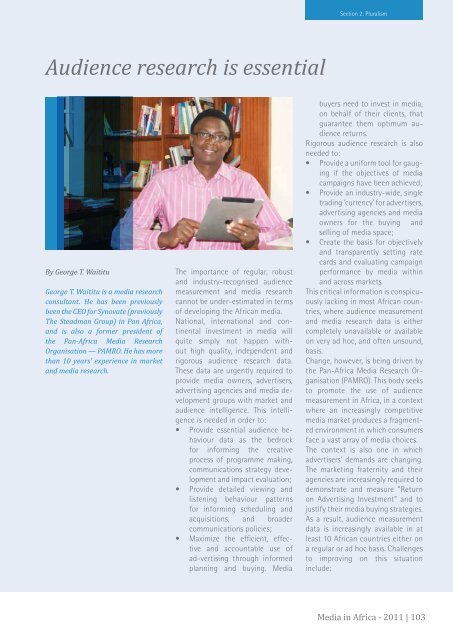Twenty years after the Windhoek Declaration on press freedom
Twenty years after the Windhoek Declaration on press freedom
Twenty years after the Windhoek Declaration on press freedom
You also want an ePaper? Increase the reach of your titles
YUMPU automatically turns print PDFs into web optimized ePapers that Google loves.
Audience research is essential<br />
By George T. Waititu<br />
George T. Waititu is a media research<br />
c<strong>on</strong>sultant. He has been previously<br />
been <str<strong>on</strong>g>the</str<strong>on</strong>g> CEO for Synovate (previously<br />
The Steadman Group) in Pan Africa,<br />
and is also a former president of<br />
<str<strong>on</strong>g>the</str<strong>on</strong>g> Pan-Africa Media Research<br />
Organisati<strong>on</strong> — PAMRO. He has more<br />
than 10 <str<strong>on</strong>g>years</str<strong>on</strong>g>’ experience in market<br />
and media research.<br />
The importance of regular, robust<br />
and industry-recognised audience<br />
measurement and media research<br />
cannot be under-estimated in terms<br />
of developing <str<strong>on</strong>g>the</str<strong>on</strong>g> African media.<br />
Nati<strong>on</strong>al, internati<strong>on</strong>al and c<strong>on</strong>tinental<br />
investment in media will<br />
quite simply not happen without<br />
high quality, independent and<br />
rigorous audience research data.<br />
These data are urgently required to<br />
provide media owners, advertisers,<br />
advertising agencies and media development<br />
groups with market and<br />
audience intelligence. This intelligence<br />
is needed in order to:<br />
• Provide essential audience behaviour<br />
data as <str<strong>on</strong>g>the</str<strong>on</strong>g> bedrock<br />
for informing <str<strong>on</strong>g>the</str<strong>on</strong>g> creative<br />
process of programme making,<br />
communicati<strong>on</strong>s strategy development<br />
and impact evaluati<strong>on</strong>;<br />
• Provide detailed viewing and<br />
listening behaviour patterns<br />
for informing scheduling and<br />
acquisiti<strong>on</strong>s, and broader<br />
communicati<strong>on</strong>s policies;<br />
• Maximize <str<strong>on</strong>g>the</str<strong>on</strong>g> efficient, effective<br />
and accountable use of<br />
ad-vertising through informed<br />
planning and buying. Media<br />
Secti<strong>on</strong> 2: Pluralism<br />
buyers need to invest in media,<br />
<strong>on</strong> behalf of <str<strong>on</strong>g>the</str<strong>on</strong>g>ir clients, that<br />
guarantee <str<strong>on</strong>g>the</str<strong>on</strong>g>m optimum audience<br />
returns.<br />
Rigorous audience research is also<br />
needed to:<br />
• Provide a uniform tool for gauging<br />
if <str<strong>on</strong>g>the</str<strong>on</strong>g> objectives of media<br />
campaigns have been achieved;<br />
• Provide an industry-wide, single<br />
trading ‘currency’ for advertisers,<br />
advertising agencies and media<br />
owners for <str<strong>on</strong>g>the</str<strong>on</strong>g> buying and<br />
selling of media space;<br />
• Create <str<strong>on</strong>g>the</str<strong>on</strong>g> basis for objectively<br />
and transparently setting rate<br />
cards and evaluating campaign<br />
performance by media within<br />
and across markets.<br />
This critical informati<strong>on</strong> is c<strong>on</strong>spicuously<br />
lacking in most African countries,<br />
where audience measurement<br />
and media research data is ei<str<strong>on</strong>g>the</str<strong>on</strong>g>r<br />
completely unavailable or available<br />
<strong>on</strong> very ad hoc, and often unsound,<br />
basis.<br />
Change, however, is being driven by<br />
<str<strong>on</strong>g>the</str<strong>on</strong>g> Pan-Africa Media Research Organisati<strong>on</strong><br />
(PAMRO). This body seeks<br />
to promote <str<strong>on</strong>g>the</str<strong>on</strong>g> use of audience<br />
measurement in Africa, in a c<strong>on</strong>text<br />
where an increasingly competitive<br />
media market produces a fragmented<br />
envir<strong>on</strong>ment in which c<strong>on</strong>sumers<br />
face a vast array of media choices.<br />
The c<strong>on</strong>text is also <strong>on</strong>e in which<br />
advertisers’ demands are changing.<br />
The marketing fraternity and <str<strong>on</strong>g>the</str<strong>on</strong>g>ir<br />
agencies are increasingly required to<br />
dem<strong>on</strong>strate and measure “Return<br />
<strong>on</strong> Advertising Investment” and to<br />
justify <str<strong>on</strong>g>the</str<strong>on</strong>g>ir media buying strategies.<br />
As a result, audience measurement<br />
data is increasingly available in at<br />
least 10 African countries ei<str<strong>on</strong>g>the</str<strong>on</strong>g>r <strong>on</strong><br />
a regular or ad hoc basis. Challenges<br />
to improving <strong>on</strong> this situati<strong>on</strong><br />
include:<br />
Media in Africa - 2011 | 103












